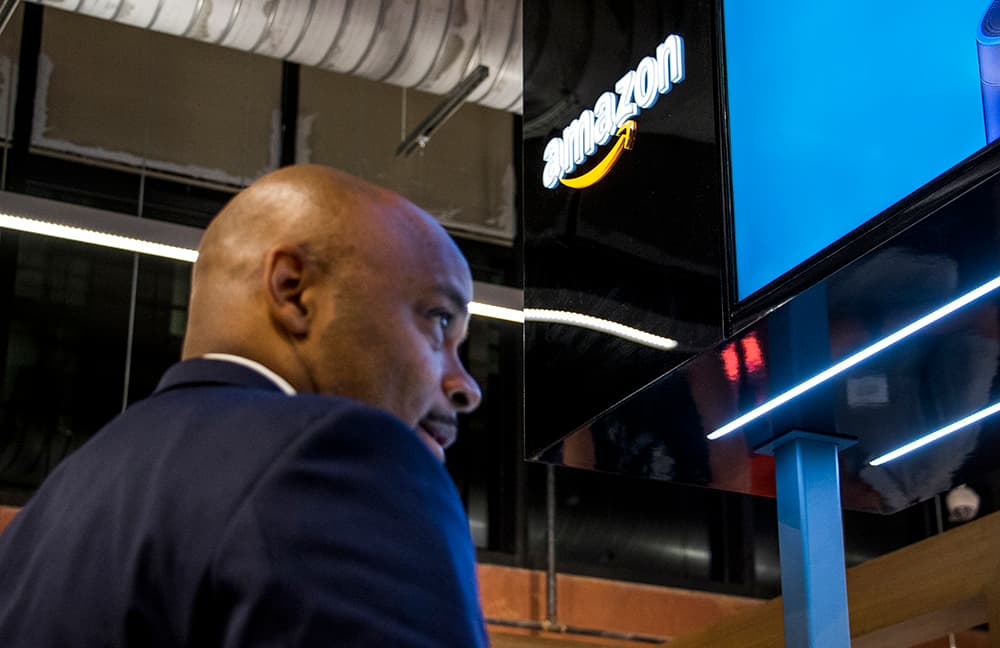A report from an advocacy group released last week is shedding light on the potential relationship between local governments — including Denver's — and Amazon that could impact how municipalities spend money.
The report "Amazon's Next Frontier: Your City's Purchasing" was authored by the Institute For Local Self-Reliance. A co-author of the report, Olivia LaVecchia, said ILSR is a research and advocacy group advocating for policies supporting a decentralized economy.
ILSR’s report focuses on a contract Amazon was awarded by U.S. Communities, a purchasing cooperative that helps state and local governments get contracts, in January 2017. The contract would allow Amazon to provide local governments with goods like classroom supplies, library books and electronics.
The report cites a two-year increase in money spent by both the City and County of Denver and Denver Public Schools with Amazon. (We reached out to the school district for comment).
It shows the school district spent $1.6 million with Amazon in 2016 and $2.8 million (a 77 percent increase) the following year. The city spent $548,419 with Amazon in 2016 and $837,588 in 2017 (a 49 percent increase). LaVecchia said these figures were provided to them by the city through a records request.
John Utterback, the supply chain administrator for Denver Purchasing, said since they’ve moved into the government, Amazon has generally been a good business partner. But he said city’s business with the company is relatively small compared to other contracts (Utterback said he couldn't speak for the school district, which has its own purchasing system).
Utterback said the city has used Amazon to buy small-dollar stuff like training and educational materials, including books. “We haven't seen a big increase (in spending)," he said. “We have a lot of contracts with local businesses, we have contracts with major corporations to do the day to day business if the city. We honor those contract and want to use those contracts."
The U.S. Communities contract could be worth as much $500 million annually over a potential 11-year term, meaning its overall worth could end up being $5.5 billion in government money — nationwide — shifting to Amazon. While Denver Public Schools is a member of the U.S. Communities Advisory Board, LaVecchia said it wasn’t clear if the totals from 2017 are part of this contract or a separate contract between the school district and Amazon.
LaVecchia said the way the contract was put together is “unusual and concerning."
“There’s a lot of evidence that for government buyers, Amazon doesn’t have the lowest prices,” LaVecchia said. She added that there are no price guarantees that are typical in public-sector purchasing. “We argue that this contract wasn’t competitively bid.”
This process essentially shut out independent office product dealers, LaVecchia said. Her team's review of the RFP showed it was basically “tailor-made” for Amazon and to eliminate competitors.
She said 12 businesses responded, with just five submitting completed materials. Among the five were specialty shops that focused on a single product; Amazon provided products for 10 categories.
LaVecchia also said the contract “lacks standard safeguards to protect public dollars and puts cities, counties and schools at risk of spending more and getting less.”
For one, she said, Amazon is already showing its dominance in the consumer market, and this big contract represents Amazon’s attempt to go after the public sector market.
“That’s really gone under the radar,” LaVecchia said. Amazon has been winning contracts at the federal level too, which has garnered some media attention, but she said local-level spending hasn’t quite attracted the same attention.
University of Denver finance professor Mac Clouse said this is just the latest example of Amazon branching out.
“I think Amazon is spreading out into things that people would never have thought they would spread into,” Clouse said, adding that few people predicted he would end up breaking into the grocery industry.
Amazon didn’t immediately return a request for comment on Friday. The ILSR report said an Amazon spokesperson declined to respond to their questions but issued a statement saying the contract was “subject to full and open competition.”
The Seattle-based company announced the big U.S. Communities contract on their blog in February 2017. The post did not include details of the amount or length of the contract.
“We’ve just made it easier for educational and public-sector organizations to get the supplies they need,” the blog post read.
Less competition could mean fewer options, leaving cities with fewer choices.
And this would be problematic for cities because less competition for vendors means less competition for pricing, according to Clouse.
“The issue is kind of the same thing we saw way back in Amazon’s beginnings when they started off selling books and they had the capability to drive their competitors out of business,” Clouse said.
Less competition in pricing means “you’re stuck with just one vendor.”
“The danger to the community and the public sector is if all your purchasing is done through one vendor, one large vendor, if that has the negative effect of eliminating vendors, you’re at the whim of that one vendor,” Clouse said.
But Amazon claims that you wouldn’t need to do that because they’re already giving you the best prices.
ILSR’s report adds that Amazon has been telling city officials one way they could keep buying from local vendors is by having them sell their products on their marketplace as third-party sellers. Of course, this would come at a cost. The report said Amazon would set the terms and take a 15 percent revenue cut.
What’s happening now in some ways is what Amazon CEO Jeff Bezos himself aspired to when he first started Amazon. Clouse said Bezos didn’t seem satisfied with becoming the biggest e-commerce seller in the U.S. or even the world. He wanted to be the biggest seller in the universe.
“That suggests he’s a big thinker,” Clouse said. “How big does he want to make Amazon? It seems like there’s no limit on how big he wants it to be.”













